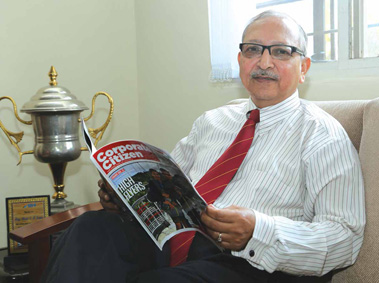
Nestled in the peaceful Dighi hills of Pune, the Army Institute of Technology is a prestigious postgraduate engineering college for the wards of army personnel. Founded in 1994, the institute has become a force to reckon with in a short span of time. The institute, affiliated to the University of Pune, is flourishing like never before under the leadership of its Director, Brig (Dr) SK Lahiri (Retd). Brig Lahiri is an engineer officer, with 33 years of experience in the Indian Army. Other feathers in his cap include a degree in PhD (HRM), an envious degree in Business Management from IIM (Ahmedabad). He has also served as a faculty member at the College of Military Engineering Pune, Officers Training Academy Chennai and Defence Services Staff College, Wellington. In his seventh year as the director of AIT, Brig Lahiri sheds light on what sets AIT apart from other colleges and the factors that make it a top notch engineering college in the country...
Back in the days when Late Gen Bipin Joshi (PVSM, AVSM, PVC) was the Army Commander, he had made a rather valid observation about army soldiers expressing concern over the profession of their children. It was also at this time that engineering was among the most lucrative career options. The nature of an armyman’s job is such that it requires him to move from one place to the other because of which there is difficulty in getting a domicile certificate. Due to these factors, Late Gen Joshi felt there was a need for higher education projects to come up more vigorously. So, the Army Institute of Technology was established. A welfare project, the college began in 1994. The building was originally meant for a public school; there were Army Public Schools running under the aegis of the Army Education Welfare Society (AEWS) and this was our step towards building a college. Thanks to the success of AIT, ten more professional colleges have opened up across the country. AIT caters only to engineering graduates and to all Army wards. For admission into the college, there is a centralised admission process through JEE Mains Exam conducted by CBSE Advocate Venugopal Rao. The admission is 100 per cent merit based. Students from all over the country seek to join AIT, which is a fully residential campus. Fortunately, we are 22 years old now and growing by the day. We are also planning to become autonomous by 2018. The process has already begun.
In a nutshell, the very fact that the student has been floating from one place to another exposes the child of an army soldier to various environments. In the bargain, they become highly adaptable to any given situation. They learn to make friends easily at different places, which in turn facilitates their inter-personal skills. I add here that the lady plays a major role in the army units. The wards see how self-reliant their mothers are and it sets a benchmark for them and they constantly fend for themselves. Secondly, discipline is the core of their daily routine. A popular phrase used in the army could well sum up their lives, “When the going gets tough, the tough gets going”. I have personally asked HR heads of various companies about what sets apart AIT students from students of other colleges, they only reiterate the points I have made. Army wards also rank highly on the employability scale, given their smartness and strong communication skills.
"The very fact that the student has been floating from one place to another exposes the child of an army soldier to various environments. In the bargain, they become highly adaptable to any given situation. They learn to make friends easily at different places, which in turn facilitates their interpersonal skills"
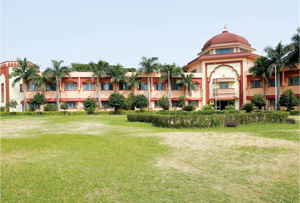
Not at all! Even before AIT was founded, we have always approved of the idea of all kinds of students studying together harmoniously. During their growing up years, students go to central schools and other schools and learn to befriend each other regardless of socio-economic differences. Frankly speaking, the army is a very egalitarian society. During a command, an officer expects the jawans to follow his instructions. But the unit life is such that they even play games together, have food together in the langar. Then there are darbars where jawans can raise issues but in a disciplined manner. So that there is no discrimination as such. Yes, initially, wards of army officers have good speaking skills having been exposed to an English medium environment, which is not the case with the children of jawans, but the latter have the tendency to pick up very fast as they already have good inter-personal and team building skills.
"Officers’ children perform very well. But in other curricular activities, children of JCOs or Other Ranks put in more effort and excel too. The real fire lies in the bellies of the children of JCOs. Jobs with the highest annual packages of Rs. 32 lakh, Rs. 27 lakh and Rs. 24 lakh—all three have gone to the wards of JCOs or Other Ranks"
Yes, it is. That has become the law of the land now. Three to four years back, there was a policy in AIT where a bunch of final year students were selected to groom the youngsters at the college. They were asked to take charge of varied hostels and help a fresher in building his/her speaking skills and interpersonal skills. However, a few of them turned out to be black sheep. We learnt through anonymous letters that these students were harassing freshers not physically, but mentally. From then on, we became very strict. We rusticated four final year students for a year, so as to send out a message to other students not to repeat the same. In the years that followed, we completely segregated the first year students and didn’t allow any students to stay with them. Of course, mentoring is still done, but now second year students mentor the first year students. Interaction between freshers and final year students is not totally blocked but has now become sort of formal. At AIT, we want open-ended communication between the alumni and students of AIT, as current students approach our alumni for internships or for technical projects and so on. There are sponsored industry projects, extra-curricular activities where students in groups of four to 30 represent the college. In such a scenario, students from all the four years are sent for competitions, therefore the interaction cannot but happen.
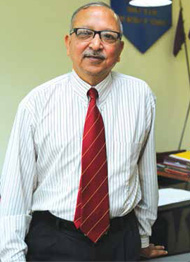
We follow university rules and procedures. The university selection committee visits to recruit faculty members. Of course, we have our own representatives too, including the principal. They are examined on technical skills among other qualities such as a positive attitude. Secondly, we look at English communication skills as English is the lingua franca of the corporate world. Thirdly and most importantly, we involve faculty members in every activity that the students undertake. We have a good system of counselling, wherein, for every 15 students, there is a faculty member to counsel – the same counselling approach we have at NDA or IMA. They are called directing staff. Within this system, the faculty members are expected to be involved with the student not just academically but also in the areas of their personal life. This has certainly paid dividends. The faculty understand students’ problems, and students also start looking up to the faculty.
Touchwood, in the last 22 years, we haven’t faced any suicidal case in our college. Being army wards, they have tremendous strength. Moreover, in hostels, students live in three-seater arrangements. Despite our offer of single-seater rooms for students with good academic performance, they prefer three-seaters. The simple reason is the free flow in exchange of ideas and thoughts and emotional support. That in itself is a stress-buster. Yes, there are cases of depression sometimes but the individual is taken care of by room-mates or on-campus professional counsellors. There are teaching counsellors and hostel wardens available at all times and so am I, as the Director. That said, every faculty member is supposed to be available during the daytime. Since we have a director, joint director and hostel wardens residing in the campus 24x7, the students do not face any crisis. With the boom in digital media, students have access to e-mail, and we make it a point that any problem is attended to.
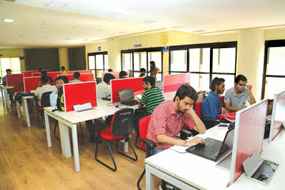
No, all our faculty members are civilians, as per university rules. There are none from an army background but initially, the college had come up with the concept. There were four to five faculty members who served as army officers. Having pursued their M.Tech from IITs, they stayed with us for two-three years. However, the army couldn’t afford to have their serving personnel posted at AIT. So, today we have only the director, joint director and the rector, who are three ex-army officers and then, there are a few wardens who are ex-JCOs. Apart from them, all 88 faculty members, including the principal are civilians.
Reward and recognition play a very important role. There are Best Teacher Awards and Best Result Awards. We are now introducing the Best Research Awards. There are incentives for a person to do PhD. When I had joined AIT, there were only five PhDs, now there are 13 PhDs and 27 in the pipeline. Then there are patents-in three years we got 24 patents, including 10 by our students. Pay also matters. We pay 6th Pay Commission scales to all our staffers. If there are any HR issues, we try to address them at the earliest.
"Reward and recognition play a very important role. There are Best Teacher Awards and Best Result Awards. We are now introducing the Best Research Awards. There are incentives for a person to do PhD. When I had joined AIT, there were only five PhDs, now there are 13 PhDs and 27 in the pipeline"
There are plenty of them. The campus is spread across 30 acres of land. We have a very good football field, two basketball courts, two volleyball courts, a tennis court, two squash courts and a badminton court. Today, Pune University has more than 750 colleges and AIT, with just 1200 students has a squash team in place, a badminton team, a basketball team, while also taking part in shooting events. We are getting represented in the university team out of such a proportion!
The number of girl applicants is less in an engineering college. Even in IITs, the percentage this year grew to only 20-22 per cent. We are under Supreme Court’s rule that there should be no reservation of any kind, anywhere, so we are going strictly merit- based. Now we get 5000 applications for 300 merit seats, and we find that only 10-15 per cent are girls. But the number is increasing every year.
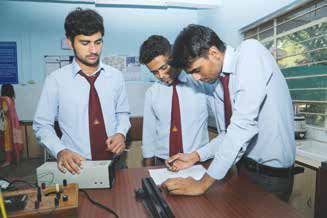
Generalisations need to be more accurate. Officers’ children perform very well. But in other curricular activities, children of JCOs or Other Ranks put in more effort and excel too. Yes, officers’ children easily get internships provided they are helped by their parents which may not be the case with JCO’s wards. In the arena of our robotic competitions, I find, for example, that all students are drawn towards them. Children of JCOs often perform exceptionally well in the BAJA club (design competitions) while officers’ children do well at debating, or finding an internship or going abroad for their MS after graduation. Yet the real fire lies in the bellies of the children of JCOs. Jobs with the highest annual packages of Rs. 32 lakhs, Rs. 27 lakhs and Rs. 24 lakhs- all three have gone to the wards of JCOs or Other Ranks. Even though officers’ wards get placement easily due to their soft skills, they have not reached the Rs. 32 lakhs category. Their placement packages usually lie between Rs. 6 to 10 lakhs.
"Approximately Rs. 61.7 crores are given out through scholarships, out of which an amount of Rs. 1.1 crores is given by the Army Group Insurance Funding where a scholarship worth Rs. 40,000 is granted to every fourth child. Additionally, there are eight corporate organisations who have started scholarships. This has resulted in more students trying for better results. The large number of scholarships on offer has been a great motivating force for students to perform well"
The fee structure is absolutely common regardless of the student’s background. One of the biggest strengths of AIT are the numerous scholarships offered. Approximately Rs. 1.7 crore are given out through scholarships, out of which an amount of Rs. 1.1 crore is given by the Army Group Insurance Funding where a scholarship worth Rs. 40,000 is granted to every fourth child. Additionally, there are eight corporate organisations who have started scholarships. This has resulted in more students trying for better results. The large number of scholarships on offer has been a great motivating force for students to perform well.
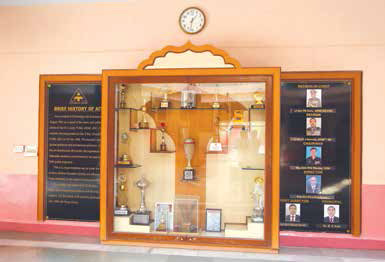
The infrastructure is good. But infrastructure alone cannot be the sole contributing factor. What makes a lot of difference is student placement, patents, faculty, research publications, etc. Today every faculty member has to write a research paper in a publication or journal which is a high impacting factor on the rankings. Then, there are various personality development programmes that are being given weightage. The students are selected through JEE mains, the cut-off for which is high. But the most important factor that has upped our rankings was the placement of our students and our infrastructure.
When I started off in 2011, there were 6000 applicants which has now dropped down to 4000 applicants. The ratio which was 22:1 has now come down to 13:1. It has gone down certainly but we are in a better position than other colleges as the intake here is still larger than many other colleges. By far, Computer is the most sought after course. Hence we have increased the number by 60 to 120. For E&TC, the intake was 120, but we have reduced it by 60 because not many electronic companies can be found in and around the western region.
We have 10 clubs in the college. First is the Robotics Club—we have recently opened up a 3DPLB Lab which is a robotic lab. We have signed an MoU with IIT and the EEE Ultra Lab has been opened too. They are all under Robotics, which is extremely popular among our students. We have a BAJA and SupraAsia Club for the Mechanical department. Then again it’s interdisciplinary so we have representatives from other departments too. Every year, they make two models everywhere. It’s a huge investment of course and they go present their models at national level competitions in Chennai, Noida, Pitampura, and have been getting prizes there. Third, there’s an Open Source Software Lab for the IT and Computer department, but as of today, students of E&TC are also using it. The Cultural Club is a very strong domain for AIT which has its own branches. There’s a Technology Club, Maths Club, Astronomy Club and Fine Arts Club. Others are subsets of them. And surprisingly, without any formal fine arts teacher, the students of this club have been performing so well. We have a cultural event—Aakriti, which is also a sports event. Students are all charged up about it. So we started something along similar lines called Tech-Aakriti which carries similar marks.
"AIT was always strong in the area of soft skills, but it was only good enough to get you placements. Gradually, after 2008, IT companies also changed their strategy and started looking for people who were more technically smart. Getting our chaps technically involved and taking pride in it has been my biggest contribution to AIT"

AIT was always strong in the area of soft skills, but it was only good enough to get you placements. Gradually, after 2008, IT-companies also changed their strategy and started looking for people who were more technically smart. We have started making students do their internships. At other places, it isn’t compulsory but at AIT, we have made it mandatory and quite a serious mission for our students. There are online course like CourseEra, Edu City and Khans Academy which students have to take up compulsorily. Built around this, we have started co-curricular course-based assessment for which every student, right from the first year starts getting graded and these grades are displayed during the time of the final year placements. Getting our chaps technically involved and taking pride in it has been my biggest contribution to AIT. Along with this, to systematise their employability skills, we have signed MoUs. Students are being assessed on aptitude—quantitative, different types of technical, mechanical, automotive engineering—and the five-factor personality test, along with technical competencies. In the bargain, we now know where we are stronger and where weaker. We are focussing on our weaknesses. The faculty members get along well with the students, the campus is fully WiFi enabled, we have national level knowledge network connections. Lesson plans are all updated on the net and classes are very interactive. This is the model we follow to make classes interesting to catch students’ attention. Case studies must be brought about in classes at least on a weekly basis. Faculty members are encouraged to work harder and students to learn a lot. These are a few of the recent achievements at AIT.
We have Civil Engineering already approved, in principle. But it involves a huge capital cost and our guidelines are that it has to be a fully residential college. The introduction of this course will increase college strength from 1200 to1440. So we need to first increase the hostel facilities and then introduce a civil engineering lab, etc. All of this costs money but it has all been approved and we will come up with this new course in the future, maybe.
We are accredited by NAAC and have got an A grade in that area, meaning alpha. Besides, the computer department has also got a grading equivalent to an alpha. Some of our labs have been reaccredited and the results will come anytime. Experts have gone through our labs and find them pretty good. Six of our labs today are industry sponsored. MoUs have been signed with eight to ten companies who are involved with our college activities. We are in the process of making fab labs for BAJA and have been equipped with latest technologies in this direction. We have also opened up a PG course for machine design in the second year.
We have an incubation centre where students are groomed, where they execute and implement their own business ideas. We have an entrepreneurs’ alumni with a strength of over 50, mostly in the IT sector. So there’s knowledge capital acquired after going abroad and later settling here and starting their own enterprise. Large numbers of students are in the process of starting their own start-ups. We have opened up an Entrepreneurship Development Cell (EDC) where we give the students focussed direction. You really have to be passionate to take up entrepreneurship. Young people today are very passionate, we just have to give them some help. Our alumni also generate funds and we too have come up with seed money to give them at low cost to invest.
Hostels are good. We don’t have air conditioned rooms like in Manipal, but our rooms are comfortable. We have built a new hostel with single rooms because final year students want to get into single rooms, but when we asked the first year chaps if we could modify their three seater and two seater rooms into single, they didn’t want it. They wanted to stay together with friends. So we shelled that plan. The toilets are as per the latest amenities and hostel rooms are Wi-Fi connected. The mess food has improved a lot, the hostel scene is okay. The buildings are 22 years old and need repair. For this we keep asking for feedback from students, but they have no issues with it.
One of the factors that makes the Army Institute of Technology a highly competitive engineering college is its competitive placements. Prof Manoj Khaladkar, Training & Placement Head, AIT, has been consistently at work to make the impossible possible. No wonder that top notch corporate organisations, including the likes of ZS Associates, Deloitte, INA Bearings, Amazon, Microsoft, Oracle, Ericsson and Godrej visit AIT for annual recruitment. The placement expert provides an insight into the prevailing placement trends at the much sought-after institute...
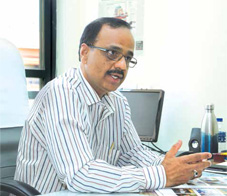
“Every industry looks for team players and the students at AIT, given their army background, offer exactly that. No wonder, in the last six to seven years, all top industries, especially product-based industries, have been recruiting our students consistently. Ninety per cent of our placements are from this sector alone, which is an achievement in itself.”
“Our average pay packages are around Rs. 5 lakhs per annum. Our maximum package stands at Rs. 32 lakhs, which was offered by Works Applications.”
“For year 2017, 73 per cent of our students have been successfully placed. Among them, HSBC has recruited massively from AIT, with pay packages varying from Rs. 7 LPA to Rs. 12 LPA.”
“We have a defined module of placements. We start grooming aspirants from the first year itself. They are tested on written English followed by a verbal test. Students are then shortlisted, graded and categorised further for training.
In the second year, soft skills are paid attention to. All the different disciplines at AIT have this advantage. A special teacher has been appointed or this. Starting from the second year, campus placement training programmes, inclusive of GDs, personal interviews, Quant practice, Analytical practice and a psychological Test (for MCAT) are held. An MCAT personality test is also conducted. Based on the personality 5-factor model, students are evaluated on different parameters like multitasking, extroversion and other qualities that make them placement ready.
placement ready. In the final year, they are trained very well, especially those who are weak at personal interviews. AIT has designed a format for the evaluation of communication skills for PI. This format has been designed after discussion and inputs from the industry and HR professionals. This format covers all the aspects of good communication skills.”
“AIT takes immense pain for good annual placements. We ensure that new names in the corporate world visit us every year. This year, for instance, a newbie hired 13 students at a good package from AIT. That apart, we approach many industries personally and send them our placement brochures. Our ranking speaks highly of us to the topmost industries.”
"Every industry looks for team players and the students at AIT, given their army background, offer exactly that. No wonder, in the last six to seven years, all top industries, especially product-based industries, have been recruiting our students consistently"
“AIT leaves no stone unturned when it is about providing encouragement to our students. We have improvised an innovative way to motivate students. Every year on Foundation Day, we invite one successful entrepreneur and one eminent industrialist and award them. The number of scholarships that we award is also high. These are industry sponsored or sponsored by NGOs, army group insurance, newspaper industry and others. One in every four students is likely to get a scholarship. Special scholarships for girls, such as Leela Poonawala and Badve scholarships have been instituted exclusively for girls.”
We have given them e-mail ids, and they keep sending regular mails if they have any queries or to seek information. We had begun the concept of PTA meetings two years back. Parents are in regular touch with the counsellors. They are kept in the loop about the marks of their wards through the website where the scores can be checked. There’s enough transparency for parents and I used to keep writing my own DOs to parents about whatever was happening in the last semester in the college.
I play golf. The 9 to5 job does not leave me with much time, but whenever I get time, I go and play golf. I am an avid reader, not just fiction, non-fiction as well. I also delve into books on employability skills, spiritual books, too. I did my PhD in HR management, titled “Employment Competencies in Small and Medium Enterprises”. That’s another area I remain in touch with. I love travelling too. My children are settled abroad, so I keep going to Europe and the US. Now I’m planning to go to smaller areas of our own country. I haven’t seen much of South India so Kerala is on my list and of course Himachal and Uttarakhand are simply fabulous! My spouse is a teacher at CME Public School, so I have to adjust my holidays and outings according to her schedule.
By Namrata Gulati Sapra